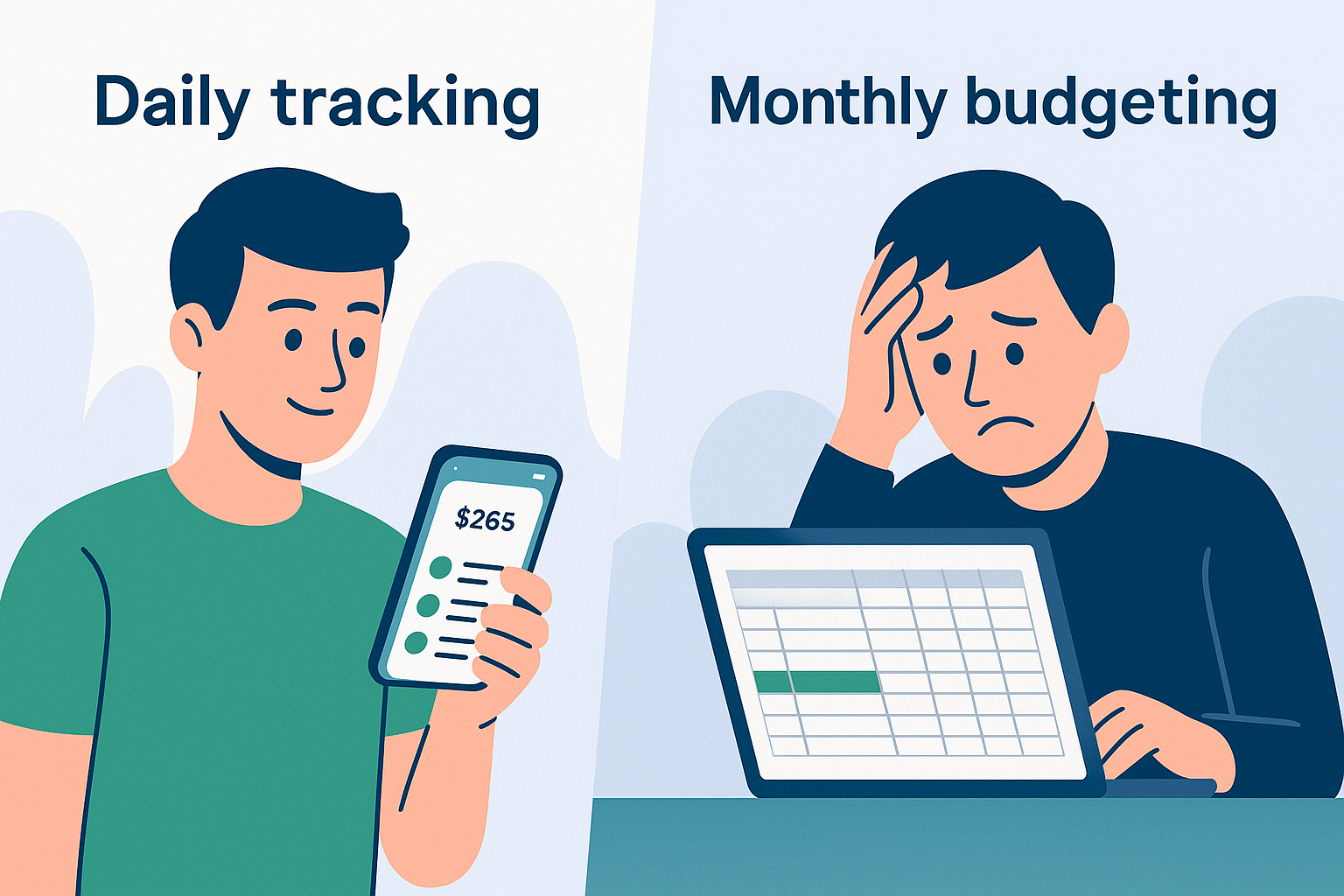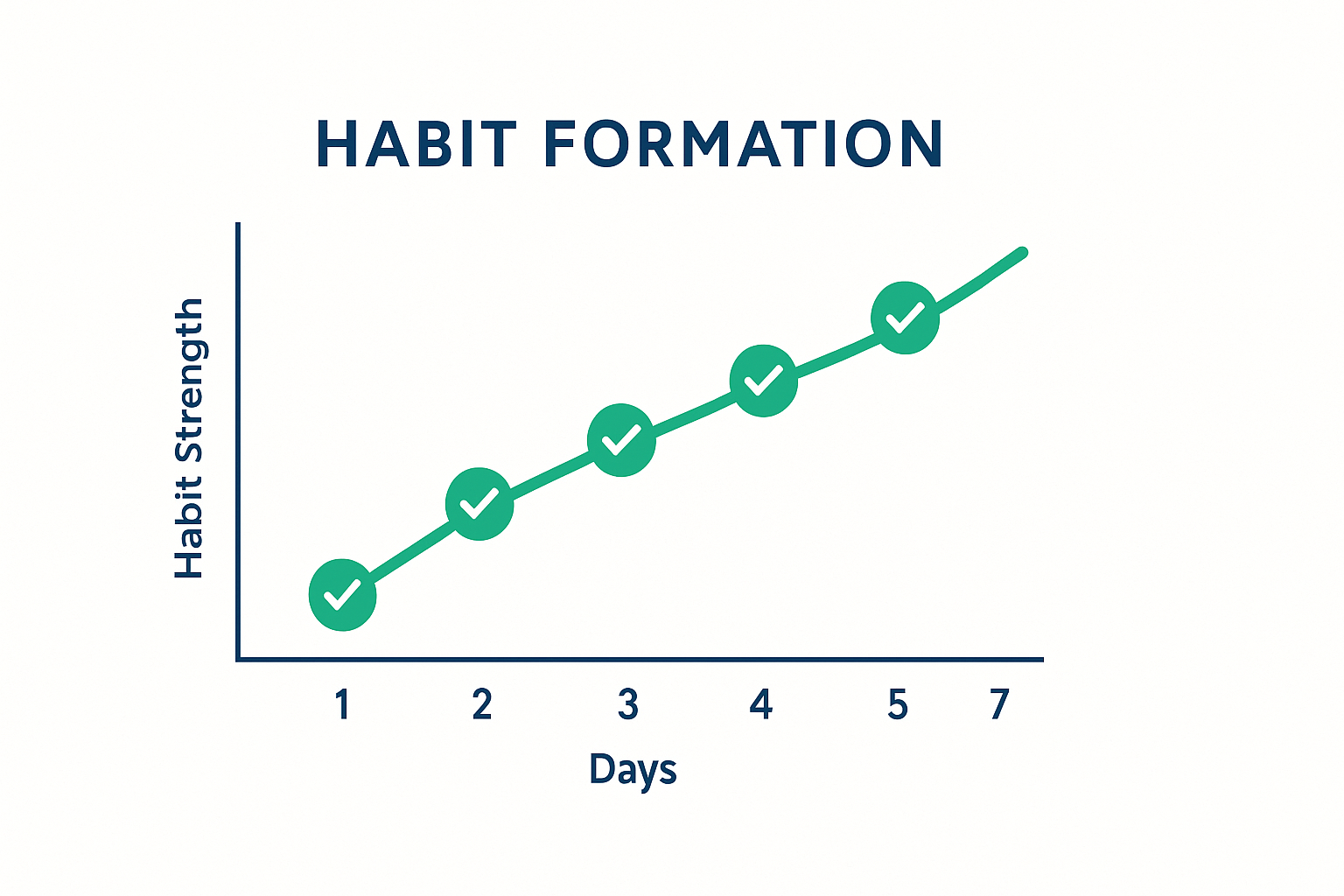
Daily financial awareness creates powerful compound effects over time
When we created DASPR (Daily Available (Safe) Spend Pulse Record), we recognized a fundamental flaw in traditional monthly budgeting: it's too distant from the moment of decision.
The Problem with Monthly Budgets
We've all been there: you create a detailed monthly budget at the beginning of the month, feel great about your financial plan, and then... life happens. By mid-month, unexpected expenses arise, and by month's end, your carefully crafted budget is in shambles. You wonder what went wrong and vow to try harder next month, only to repeat the cycle.
This frustrating pattern isn't a reflection of your financial discipline—it's a fundamental flaw in monthly budgeting itself. Monthly budgets fail for the same reason annual fitness goals and New Year's resolutions do: they're too distant from daily decisions.
"The gap between intention and action is bridged by awareness at the moment of decision."
The Science of Daily Decision-Making
Behavioral research consistently shows that humans struggle with long-term planning. We're wired for immediate feedback and present-focused decision-making. When we rely on monthly budgets:
- We lose the connection between today's spending choices and their impact
- We experience decision fatigue from constant mental calculations ("How much is left in my restaurant category?")
- We lack immediate feedback until it's too late to adjust course
- We face psychological hurdles like the "fresh start effect" (waiting until next month to improve)
A study from the Journal of Consumer Research found that people who tracked expenses daily were 80% more likely to stay within their financial goals compared to those who only reviewed finances monthly.

The critical moment of financial awareness occurs at the point of decision
The Power of Daily Financial Awareness
Shifting to a daily financial focus transforms your relationship with money in several powerful ways:
1. Creates Immediate Awareness
When you know exactly how much you can spend today, each purchase decision becomes a conscious choice rather than an automatic behavior. This awareness is the essential first step in behavior change.
2. Leverages the Compound Effect
Small daily decisions compound dramatically over time. Saving just $5 per day—an amount you might not notice in a monthly budget—adds up to $1,825 per year. The daily approach makes these small choices visible and meaningful.
3. Provides Actionable Feedback
Daily tracking gives you immediate feedback on your financial decisions. Rather than discovering at month-end that you've overspent, you know immediately how today's choices affect your financial health.
4. Builds Sustainable Habits
Habit research shows that consistent daily practice is far more effective than occasional intense effort. A simple daily financial check-in creates a sustainable habit that outlasts the motivation of any budgeting system.

Consistent daily actions build powerful financial habits over time
How to Implement Daily Financial Focus
Transitioning from monthly to daily financial awareness doesn't have to be complicated. Here are practical steps to make the shift:
Start with One Clear Number
Calculate a single daily spending amount that accounts for your income, fixed expenses, and savings goals. This "Daily Safe Spend" becomes your financial North Star—one simple number to guide daily decisions.
Create a Morning Check-in Ritual
Take 30 seconds each morning to check your Daily Safe Spend. This tiny habit, when paired with your morning routine (like after brushing your teeth), becomes automatic over time.
Record Transactions in the Moment
The act of manually recording expenses creates a powerful moment of awareness. Don't worry about perfect accuracy—ballpark amounts are fine. The goal is awareness, not accounting precision.
Look for Patterns, Not Perfection
Instead of focusing on perfect adherence to a budget, look for patterns in your daily spending. These insights reveal your actual financial behavior and opportunities for improvement.
The Daily Approach in Action
Jamie, a DASPR user, shares her experience: "I tried monthly budgeting apps for years but always gave up by mid-month. With daily tracking, I finally broke the cycle. Knowing exactly what I can spend today has eliminated my financial anxiety and helped me save consistently for the first time."
Another user, Michael, notes: "The daily approach helped me discover that my weekday spending was fine, but weekends were destroying my budget. This simple insight—which was invisible in my monthly budget—allowed me to make targeted changes that actually stuck."
Beyond Budgeting: Financial Wellness
The daily approach transforms financial management from budgeting (a restrictive, backward-looking activity) to financial wellness (a positive, forward-looking mindset).
Just as physical health is maintained through daily habits rather than monthly check-ups, financial health thrives on daily awareness rather than monthly reconciliation. Your financial vital signs—like your physical vital signs—deserve daily attention.
"Financial wellness isn't about restricting spending; it's about aligning spending with what truly matters to you. Daily awareness makes this alignment possible."
Conclusion: The Daily Difference
Monthly budgets will always have their place in financial planning, but they're fundamentally disconnected from how we actually make spending decisions. By shifting to a daily focus, you bridge the gap between financial intention and action.
Daily financial awareness isn't about restriction—it's about clarity. It's about knowing exactly what you can spend today so you can make confident decisions in the moment.
Ready to experience the power of daily financial focus? Learn how DASPR makes daily financial awareness simple and effective.
Share this article:



